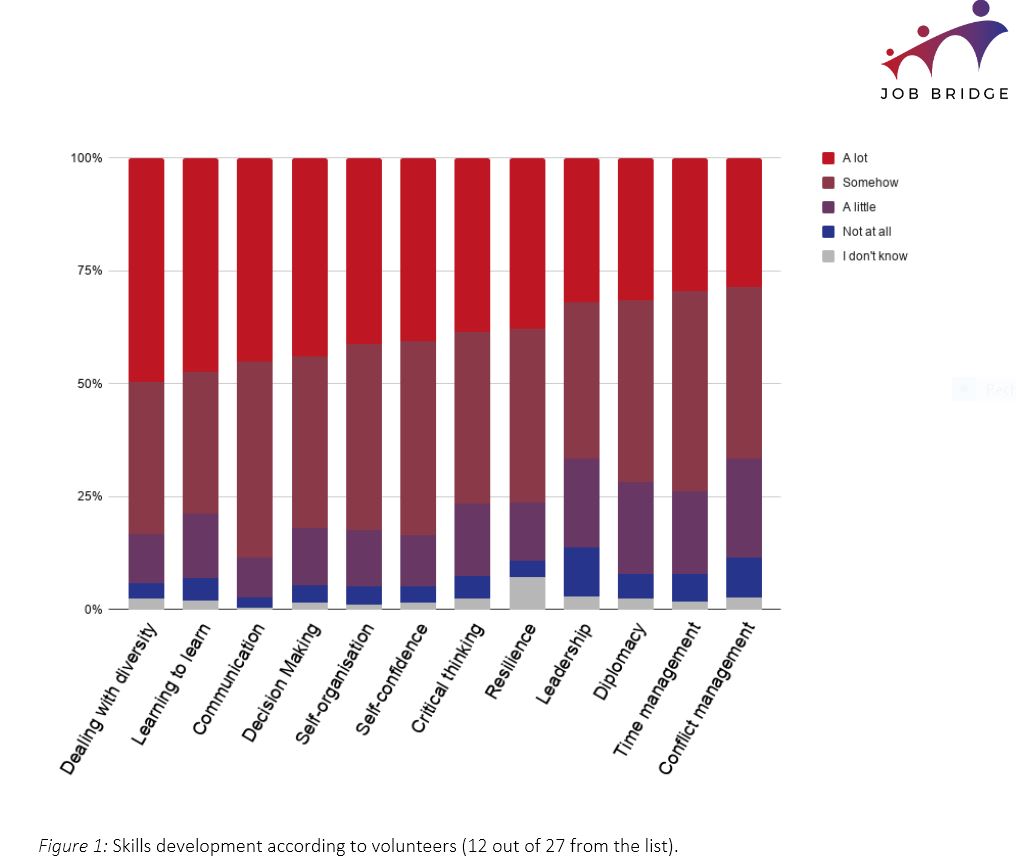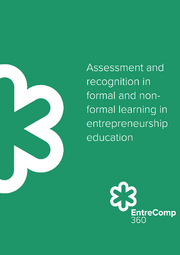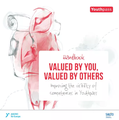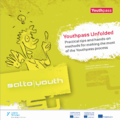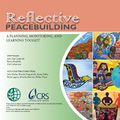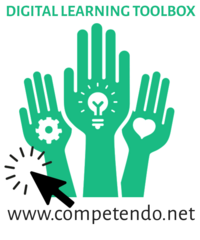Contents
- 1 Learning Outcome
- 2 Most Relevant Competences Addressed through Volunteering
- 3 Recognition and Validation
- 3.1 Recognition
- 3.2 Validation
- 3.3 Compatible Language of a Context
- 3.4 European Skills/Competences, Qualifications and Occupations (ESCO)
- 3.5 Key Competences for Lifelong Learning
- 3.6 Citizenship, Human Rights
- 3.7 European Qualification Framework (EQR)
- 3.8 Other Competence-related Tools and Methods
- 3.9 Articles, Checklists and Methods
- 3.10 Assessment and recognition in formal and non-formal learning in entrepreneurship education
- 4 Inspiring Handbooks and Sources from the Community
- 5 Apps and Tools: Recognition, Assessment, Validation
- 6 References
Learning Outcome
Statements of what a learner knows, understands and is able to do after completion of learning. [1]
Learning outcome includes skills, knowledge and attitudes.
In particular civic engagement and volunteering are contributing to broad range of competences like the study and survey Job Bridge is showing. The most relevant competences in the opinion of volunteers are illustrated by the graphic below. However, the lack often recognition among learners and also among the society - for instance by fellow citizens, organizations, employers. In this sense, we as educators should spend some efforts in order to help learners to get their competencies recognized and also to show the social impact and value of Education for Democratic Citizenship and of civil engagement through our learners' recognition.
Most Relevant Competences Addressed through Volunteering
Source: Job-Bridge, p. 20 [2]
Recognition and Validation
Recognition
- Awareness and appreciation of competences
- The basis is self-recognition, including "personal awareness and assessment of learning outcomes, and the ability to use these learning outcomes in other fields."[3]
- Social recognition and political recognition are describing how others acknowledge and describe the competence of a learner.
- Formal recognition is describing and comparing learning, often in form of certificates, licenses, or similar, issued by a formal or non-formal educational institution.
The EU education policy context uses also the term validation for measures of formal recognition.[4]:
Validation
- The confirmation by a competent body
- that learning outcomes have been identified and documented
- assedded against predefined criteria
- compliant with the requirements of a validation standard.
- Validation typically leads to certification.
A social goal of competence description is recognition. Educators help learners with certificates and a rich evaluation methodology to proof their abilities so that others recognize them and also to support them in recognizing their competences by themself.
Especially in non-formal education, educational providers and educators are not working for an authority which certifies in a comparable way like a formal learning provider. In consequence they are not bound to validation standards. Certificates of attendance, letters of recommendation or similar gain their credibility in the non-formal educational context especially through plausibility and through the credibility of the certifying organisation.
Since an individual learner needs in absence of formally recognized certificates to be able to explain their competences to others, it is necessary to dedicate attention in workshops and trainings to supporting self-reflection and self-recognition.
Attention needs also to be paid to a credible description on evidence base. The description of competence and learning outcome must go beyond formal grades in order to cover the broad aspects of competences. It should be helpful in the learners future and relevant for those third, whom learners need to proof their abilities and expertise.
Compatible Language of a Context
Depending on where the learner needs recognition, it is worth to take care about words and aspects that can be helpful. A lot of social contexts use specific language and have specific expectations toward the learning outcome. Conscious language and choice might give a description or certificate more value.
European Skills/Competences, Qualifications and Occupations (ESCO)
ESCO (European Skills, Competences, Qualifications and Occupations) offers a standardized terminology that includes skills, competences, qualifications and occupations. Its outcome for citizens and employees is to find the right terms for their formal and non-formal qualifications or for the job profiles they wish to develop. As well non-formal training provider may use the classifications for validation
Key Competences for Lifelong Learning
A reference point in the EU context (more. Specific competence frameworks were until 2023 DigComp, EntreComp, LifeComp and GreenComp
Citizenship, Human Rights
The EU was not yet elaborating a framework for citizenship competences. The entrepreneurship competence framework EntreComp includes some aspects - like proactivity, initiative and collaboration. The European reference point is the Council of Europe's Reference Framework of Competences for Democratic Culture (RFCDC). Originally created for democracy-related learning in schools, it is more and more applied in non-formal and lifelong learning.
European Qualification Framework (EQR)
The European Qualification Framework (EQF) and the subordinated EU member state's national qualification frameworks seek to make the different national education systems more compatible and describe vocational profiles and educational outcome for a broad range of educational fields. The framework provides 8 levels of proficiency. The framework provides "benchmarks for qualification levels across Europe and encourage the embedding of validation systems with formal qualifications system"[5]
Assessment and recognition in formal and non-formal learning in entrepreneurship education
An introduction into competency-based assessment and evaluation not only for entrepreneurship education by the project EntreComp 360, by Hazel Israel (Bantani Education) with Svanborg Rannveig Jónsdóttir and Ramón Martínez.
Inspiring Handbooks and Sources from the Community
Valued by You, Valued by Others
Improving the visibility of competences in Youthpass (and also in other contexts)
DownloadRecognizing Learning in Youth Exchange
Youth Work Service, Léargas' handbook complementary to YouthPASS, with suitable methods as well for evaluation and competence assessments without using the YouthPASS
DownloadAssessment and recognition in formal and non-formal learning in entrepreneurship education
An introduction not only for entrepreneurship education by the project EntreComp 360
DownloadThe Learning Curve
A guide to evaluation for youth organizations
DownloadYouthPASS unfolded
Practical tips and hands-on methods to make the most of the Youthpass process edieted by SALTO and Jugend für Europa
DownloadAssessing competences for democratic culture
Principles, methods, examples by Council of Europe
DownloadEmpower yourself
Self-assessment tool created by the French Scout and Guides movement
DownloadFacilitation Step-by-step
Competendo Portfolio Tool for Facilitators
DownloadCaptain's Log
Competency-related portfolio tool
DownloadReflective Peacebuilding
John Paul Lederach, Reina Neufeldt, Hal Culbertson,
Kroc Institute for International Peace Studies: Planning oriented on impact Download
Apps and Tools: Recognition, Assessment, Validation
Several online tools support learners and educators in (self-)assessment. However, one should check their terms and conditions for storing and using personal data before using them in trainings.
AppRaiser
Trainers appraisal platform of the International Youth Work Trainers Guild
AppRaiserGo Formative
Track developments of learners online
Go formativeOpen Badges
Share "learning badges" with your learners for every achievement in a learning process with help of a digital platform.
Open BadgesEaSY soft skills
A skill assessment online tool, model and method handbook
OnlineSkilloon
A research-based self-learning platform following the EntreComp model from Not a bad idea (Finland) and the Finnish education ministry.
Online
References
- ↑ European Centre for the Development of Vocational Training, 2009: The shift to learning outcomes Policies and practices in Europe; p. 30
- ↑ P. Boivin, J. Baez: Job Bridge – Stocktaking report on the state-of-play of validation in the voluntary sector across the EU; Lifelong Learning Platform; Brussels; October 2019;
- ↑ YouthPass: About Recognition
- ↑ European Centre for the Development of Vocational Training, 2009: [www.cedefop.europa.eu/EN/Files/3054_en.pdf The shift to learning outcomes Policies and practices in Europe]; p. 15
- ↑ European Centre for the Development of Vocational Training (Cedefop) 2009: European guidelines for validating non‑formal and informal learning; p. 30
- ↑ Following the discussion of: European Centre for the Development of Vocational Training (Cedefop): European guidelines for validating non‑formal and informal learning; p. 44




